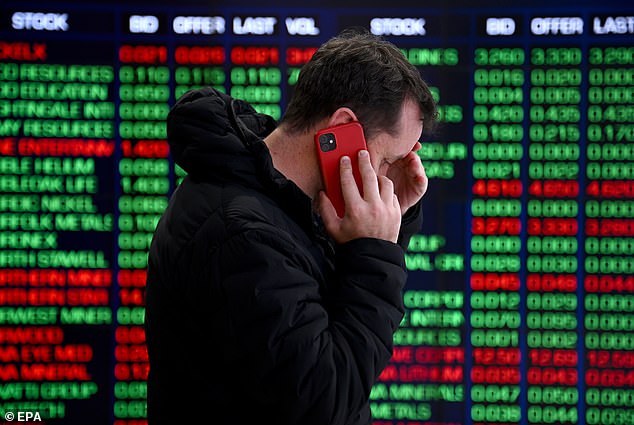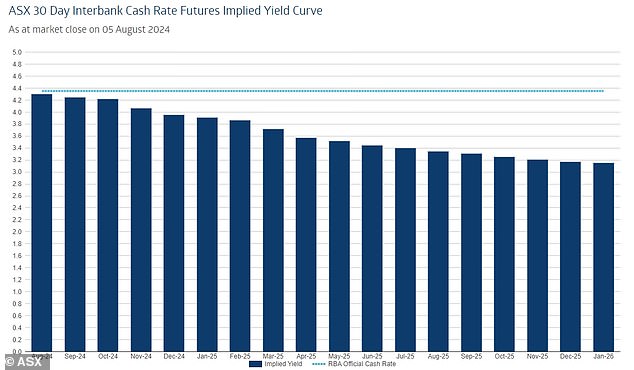Interest rate decision: RBA to make a rate call amid sharemarket bloodbath
Australian home borrowers could face major interest rate cuts ahead of Christmas after fears of a US recession wiped more than $150 billion off the local stock market in just two days.
The 30-day interbank futures market is now predicting rate cuts in November and December, the first consecutive rate cuts since the pandemic hit in early 2020.
The main S&P/ASX200 index fell 293.6 points, or 3.7 percent, to 7,649.6 on Monday – the biggest one-day drop since May 2020.
That represented a loss of 5.8 percent – or $160 billion – for the local bourse over the past two trading days, after the stock market closed 2.1 percent weaker on Friday.
The broader All Ordinaries fell 311 points, or 3.81 percent, to 7,859.4.
The ASX has not seen such a severe two-day sell-off since March 2020, when markets were rocked by the outbreak of the COVID-19 pandemic.
Financial markets have collapsed on fears that the US Federal Reserve will have to cut interest rates to avert a recession in the world’s largest economy.
Steven Daghlian, market analyst at CommSec, said a jump in the US unemployment rate to 4.3 per cent, the highest level since October 2021, rattled financial markets and dragged down the Australian Securities Exchange.
Australian home borrowers could face huge interest rate cuts by Christmas after fears of a US recession wiped $90 billion off the local stock market in just two days
The US unemployment rate is half a percentage point higher than in March, reminding traders that Sahm rule theory states that a recession is likely if unemployment rises by 0.5 percentage points in a year.
“Concerns about the US economy – last week there was a lot of data pointing to a slowing economy, from jobs to manufacturing,” he told Daily Mail Australia.
Japan’s first interest rate hike in 17 years also hit traders who had borrowed yen to buy U.S. technology stocks. Payments app Block Inc, formerly known as Square, fell 5.3 percent on the New York Stock Exchange.
“There is more attention to the carry trade in Japan as interest rates rise,” Daghlian said.
But amid the turmoil, Mr Daghlian said the Reserve Bank was unlikely to cut rates on Tuesday, despite concerns in financial markets that central banks around the world were being too slow to ease monetary policy.
“It’s probably unlikely that they would do that because it would probably send the wrong signal and make the markets anxious,” Daghlian said.
‘I don’t think the Reserve Bank is going to make any rash decisions today that will surprise the markets in a significant way.’

The Australian stock market fell 3.7 percent on Monday, wiping out more than $50 billion in one day, the worst day in more than four years

The 30-day interbank futures market is now predicting rate cuts in November and December, marking the first consecutive rate cuts since the pandemic hit in 2020
‘This is also the first RBA meeting in seven weeks. These kinds of meetings don’t happen very often these days.’
The Commonwealth Bank, Australia’s largest mortgage lender, is forecasting a rate cut in November but not in December. The RBA meets in both months, up from eight meetings a year now.
Two rate cuts in 2024 would, as forecast by the futures market, take the Reserve Bank’s cash rate back to 3.85 percent for the first time since June 2023.
Monthly payments on an average $600,000 mortgage would drop by $197.
The futures market has also priced in five rate cuts through the end of 2025, which would bring the cash rate back to 3.1 percent for the first time since February 2023.
Scott Solomon, portfolio manager at T. Rowe Price, said it is almost certain the Reserve Bank’s board will not raise the cash rate from its current 12-year high of 4.35 percent.
‘Markets were expecting the probability of a rate hike by the RBA before the end of the year to be almost 50 percent, but that has now completely reversed. Markets are now estimating the probability of a rate cut before the end of the year to be almost 100 percent.’
The Australian Securities Exchange opened weaker again on Tuesday, but the All Ordinaries index was down just 0.24 percent in early trading.
